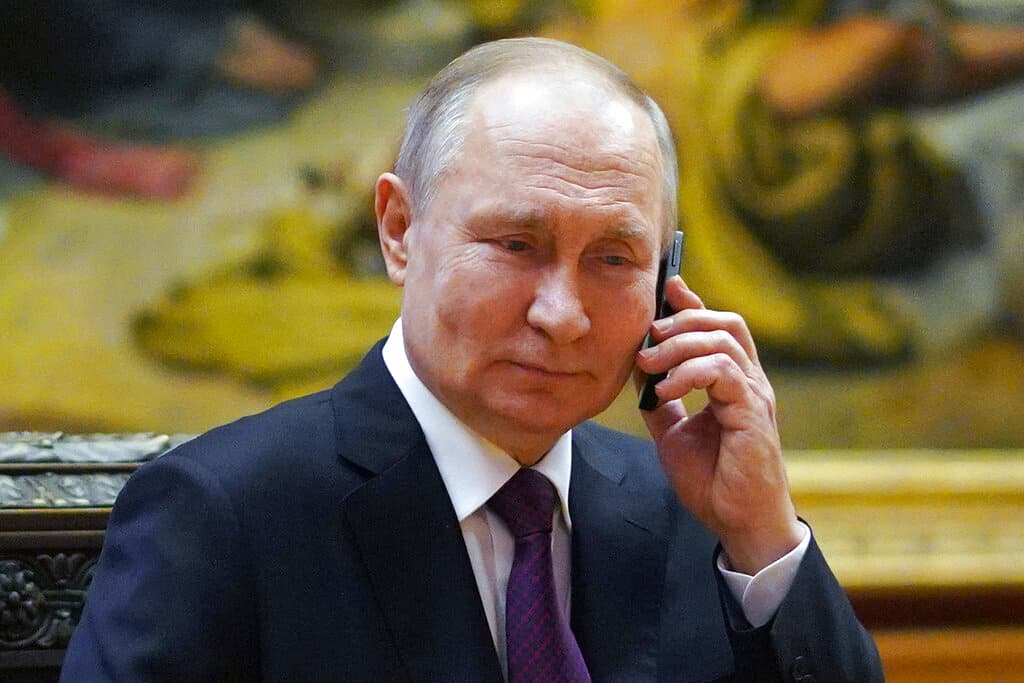Putin’s Taunting of Boris Johnson May Be a Jest
Germany-Russia grief, though, is anything but a laughing matter.

It isn’t every day that Vladimir Putin threatens to hurl a rocket in your general direction, but neither is it out of the ordinary for the unflappable Boris Johnson to take such a taunt in measured stride. In a documentary named “Putin v. the West” that will air on the BBC today, the former leader and Conservative party stalwart said that in the course of a phone conversation with Mr. Putin before Russia invaded Ukraine, the Russian president told him, “Boris, I don’t want to hurt you, but with a missile it would only take a minute.”
The Kremlin’s spokesman, Dmitry Peskov, told reporters on Monday that what Mr. Johnson said was “a lie.” Yet as he recounts it, Mr. Johnson also hastened to add that, “I think from the very relaxed tone that [Putin] was taking, the sort of air of detachment that he seemed to have, he was just playing along with my attempts to get him to negotiate.”
He said that Mr. Putin asked him in English, “Boris, you say that Ukraine is not going to join NATO any time soon — what is any time soon?” Mr. Johnson replied that Ukraine would not be joining the military alliance “for the foreseeable future” and that Mr. Putin knew that “perfectly well.”
A little more than a week after that call, on February 11, the British defense secretary, Ben Wallace, left a meeting with his Russian counterpart, Sergei Shoigu, at Moscow convinced that Russia would soon invade Ukraine. In the documentary, Mr. Wallace said that the Russian chief of general staff, Valery Gerasimov, told him that “never again will we be humiliated.”
To what extent wounded pride was a factor in Mr. Putin’s decision to march troops into neighboring Ukraine on February 24 is debatable, but that he did so marked the start of another dark chapter in what for many in the West is still a fairly remote corner of Europe’s east. It is a region that is never far from the Kremlin’s geopolitical calculus — and nowhere is this more so than at Volgograd, to which Mr. Putin will travel on Monday to mark the start of the 80th anniversary of victory in the Battle of Stalingrad.
The biggest battle of World War II, the Battle of Stalingrad ended with the surrender of Nazi Germany on February 2, 1943. The scope of the devastation and battlefield losses were staggering; after more than five months the historic city (which was renamed Volgograd in 1961) was almost entirely destroyed and the Russians suffered more than a million combat casualties and losses. German casualties were extremely high too, and the Wehrmacht’s retreat also spelled the beginning of Adolf Hitler’s defeat.
Right now the fiercest fighting in Ukraine is happening less than 300 miles west of Volgograd. In his nightly video address, President Zelensky said that “in the Donetsk region there are continuous Russian assaults and constant attempts to break through our defenses,” underscoring Ukraine’s pressing need for more advanced weapons. Many of those, notably a significant number of high-tech combat tanks to be supplied by Berlin, Washington, and London, will be en route to Ukraine imminently.
Yet the debate over how much to arm Ukraine, and specifically with what is still raging and will have more of an impact on how long the war does or not drag on than any rhetorical jousting between world leaders past and present. In the latest example, the German chancellor, Olaf Scholz, has rejected Kyiv’s demands for fighter jets to complement the Leopard 2 tanks. Mr. Scholz told Tagesspiegel on Sunday that the question of combat aircraft “does not arise at all,” adding “I can only advise against entering into a constant competition to outbid each other when it comes to weapons systems.”
In that thinking, the ghosts of Stalingrad — which was a global but also a fundamentally European battle, pitting two armies and ideologies against one another — loom very large. They also haunt Hungary, where on Friday the country’s iconoclastic prime minister, Viktor Orban, said that Western countries arming Ukraine in its efforts to eject the Russian invaders have “drifted” into becoming active participants in the conflict. Not surprisingly, Ukraine summoned Budapest’s envoy over the comments.
Relations between Ukraine and Hungary are increasingly fraught. There is not much mood music coming from Paris either: unlike Mr. Johnson, President Macron fell for Mr. Putin’s bluff and has fumbled for a way forward ever since. And now — cue les phantomes de Stalingrad — a grandson of General de Gaulle has lambasted not Moscow for the war, but Washington: “The French are paying a heavy price for a war provoked by the United States to turn Europe into a vassal,” Pierre de Gaulle told the Le Parisien newspaper.
In the meantime Russian attacks are unrelenting, as Mr. Zelensky noted. Russian strikes Sunday and Monday around Donetsk, Kherson, Kharkiv, Zaporizhzhia, and five other Ukrainian regions resulted in five civilian deaths and more than a dozen injuries. Moscow, for its part, has accused Ukraine of targeting a hospital in rebel-held eastern Luhansk, with more than a dozen reported dead.
When Mr. Putin convenes his Russian security council meeting next week — almost immediately after the politically charged visit to Volgograd — he will likely hint at fresh offensives and mobilization drives as the war nears the one-year mark. Even absent an official announcement by the Kremlin to that effect, it looks likely that more mayhem will be appearing on the European menu.

